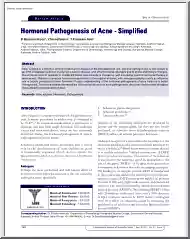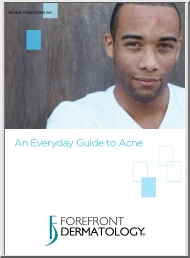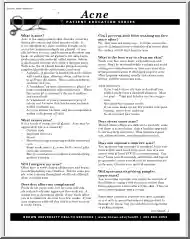Nincs még értékelés. Legyél Te az első!
Mit olvastak a többiek, ha ezzel végeztek?
Tartalmi kivonat
Do You Have Rosacea? “Do you have sunburn? Are you OK? You’re really red.” The redness may not be sunburn; it could be the effects of rosacea, a common skin problem that’s estimated to affect more than 14 million Americans. While it’s not a serious condition, rosacea does take its toll on patients. According to surveys published by the National Rosacea Society, 70 percent of rosacea patients reported having lower self-esteem because of their skin’s appearance. Forty-one percent said they avoided public contact because of the condition, and for those experiencing severe symptoms, almost 30 percent reported missing work because of their troublesome skin. “I have patients who never want to go out without makeup,” says Kristen Savola, MD, a boardcertified dermatologist and director of Augusta Health’s La Vie Laser & Cosmetic Dermatology and La Vie Medi-Spa. Rosacea, which results from swelling of blood vessels just under the skin, typically appears on the
faceespecially the cheeks, nose and chin area. While it’s more common in those ages 30 and older, it can occur in those younger as well. There’s no exact cause known and the chronic condition, which may come and go, has no cure. According to Dr. Savola, rosacea tends to be hereditary, affect women more than men and is more prevalent in people of northern European descent, or those with light eyes and light skin color (although it can affect those with darker skin, too). In addition to redness, it can also cause acne-like sores, sensations of burning or stinging in the skin, red or irritated eyes and, less commonly, swollen nose tissue that can lead to enlarged (bulbous) noses. Rosacea may be confused with other ailments, such as seborrheic dermatitis and lupus. While the cause is unknown, certain stressors are known to trigger a flare-up of rosacea, including: • alcoholic, caffeinated or hot beverages • emotional stress • exercise • hormonal changes, such as menopause •
hot baths • hot or cold weather • skin-care products • spicy foods • sunlight • wind A first step to helping control rosacea is to avoid any triggers that seem to send rosacea into overdrive. A gentle skin cleanser and a moisturizer, Dr Savola says (ask your dermatologist for recommendations), and a neutralizing foundation and powder that have a green tinge to them to counteract the redness also can help. Rosacea can be a little tricky to treat, and additional interventions will usually be necessary: • Medications > Anti-inflammatory/antibiotic creams and gels such as metronidazole applied to the skin can work well to reduce inflammation and rosacea-related acne, Dr. Savola says > Low-dose oral antibiotics, such as doxycycline, can be used for their anti-inflammatory effects and also work well on rosacea acne. • Laser surgery > In her experience, Dr. Savola has found that those patients who have just redness don’t benefit as much from creams or pills. In
these cases, treatment with a special vascular laser has yielded the best results. The treatment takes anywhere from one to three sessions and, while it doesn’t treat the acne aspect of rosacea, it can be used in conjunction with other treatments to effectively control the condition as a whole. Most insurance companies don’t cover the cost of the laser, but Dr. Savola notes it’s not a very expensive treatment option at $250 to $300 per session, especially when compared to the cost of a regular medication regimen. But what about preventing rosacea? Like causes and cures, there’s no answer there either. The best advice, Dr. Savola says, is to find a sunscreen that doesn’t irritate your skin and be diligent about applying it. “Sun damage only makes things worse,” she says To learn more about the laser and cosmetic dermatology services, contact your physician or Augusta Health’s La Vie Laser & Cosmetic Dermatology and La Vie Medi-Spa at www.augustahealthcom/la-vie
faceespecially the cheeks, nose and chin area. While it’s more common in those ages 30 and older, it can occur in those younger as well. There’s no exact cause known and the chronic condition, which may come and go, has no cure. According to Dr. Savola, rosacea tends to be hereditary, affect women more than men and is more prevalent in people of northern European descent, or those with light eyes and light skin color (although it can affect those with darker skin, too). In addition to redness, it can also cause acne-like sores, sensations of burning or stinging in the skin, red or irritated eyes and, less commonly, swollen nose tissue that can lead to enlarged (bulbous) noses. Rosacea may be confused with other ailments, such as seborrheic dermatitis and lupus. While the cause is unknown, certain stressors are known to trigger a flare-up of rosacea, including: • alcoholic, caffeinated or hot beverages • emotional stress • exercise • hormonal changes, such as menopause •
hot baths • hot or cold weather • skin-care products • spicy foods • sunlight • wind A first step to helping control rosacea is to avoid any triggers that seem to send rosacea into overdrive. A gentle skin cleanser and a moisturizer, Dr Savola says (ask your dermatologist for recommendations), and a neutralizing foundation and powder that have a green tinge to them to counteract the redness also can help. Rosacea can be a little tricky to treat, and additional interventions will usually be necessary: • Medications > Anti-inflammatory/antibiotic creams and gels such as metronidazole applied to the skin can work well to reduce inflammation and rosacea-related acne, Dr. Savola says > Low-dose oral antibiotics, such as doxycycline, can be used for their anti-inflammatory effects and also work well on rosacea acne. • Laser surgery > In her experience, Dr. Savola has found that those patients who have just redness don’t benefit as much from creams or pills. In
these cases, treatment with a special vascular laser has yielded the best results. The treatment takes anywhere from one to three sessions and, while it doesn’t treat the acne aspect of rosacea, it can be used in conjunction with other treatments to effectively control the condition as a whole. Most insurance companies don’t cover the cost of the laser, but Dr. Savola notes it’s not a very expensive treatment option at $250 to $300 per session, especially when compared to the cost of a regular medication regimen. But what about preventing rosacea? Like causes and cures, there’s no answer there either. The best advice, Dr. Savola says, is to find a sunscreen that doesn’t irritate your skin and be diligent about applying it. “Sun damage only makes things worse,” she says To learn more about the laser and cosmetic dermatology services, contact your physician or Augusta Health’s La Vie Laser & Cosmetic Dermatology and La Vie Medi-Spa at www.augustahealthcom/la-vie




 Ahogy közeledik a történelem érettségi, sokan döbbennek rá, hogy nem készültek fel eléggé az esszéírás feladatra. Módszertani útmutatónkban kitérünk a történet térbeli és időbeli elhelyezésére, a források elemzésére és az eseményeket alakító tényezőkre is.
Ahogy közeledik a történelem érettségi, sokan döbbennek rá, hogy nem készültek fel eléggé az esszéírás feladatra. Módszertani útmutatónkban kitérünk a történet térbeli és időbeli elhelyezésére, a források elemzésére és az eseményeket alakító tényezőkre is.